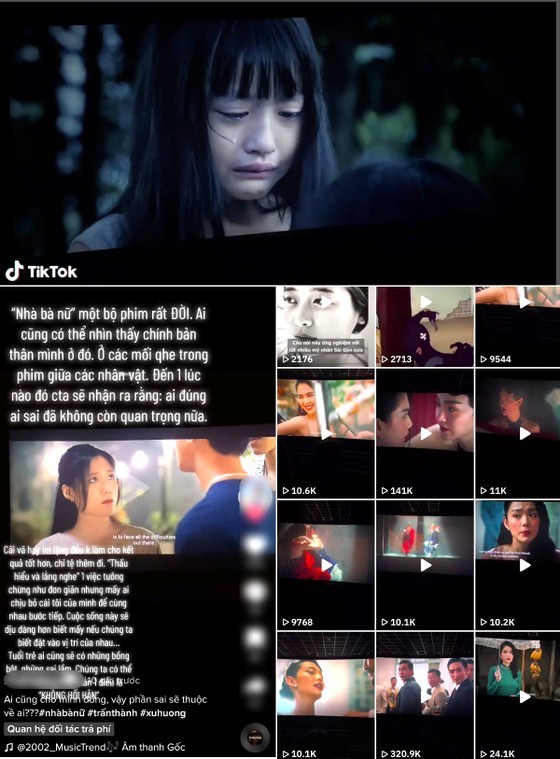 |
Many movies in theater are illegally recorded and posted on TikTok at the beginning of 2023 |
19-year-old Tran Vu Anh T. from District 5 of Ho Chi Minh City is leisurely surfing the Internet to find available video piracy websites to watch a favorite film. Since the infamous phimmoi.net has been down, T. visits a similar one at the address of phimmoiz.net. After turning off some advertising pop-ups and waiting a bit more to see whether any marketing sites pop up or not, it is now possible for T. to enjoy the film happily from the beginning to the end.
T. happily shared that thanks to his experience of watching pirated movies for so many years, he knows both available websites and corresponding tricks to eliminate advertisements there to see films uninterruptedly. Therefore, to him, there is no need to go to the cinema.
Among infamous piracy film sites, phimmoi.net has been a legacy thanks to its persistence for more than 10 years. The law violations of this site are through illegally copying and then displaying, spreading cinematographic works to the public to gain large illicit profits from advertising products and services illegally on copyrighted films.
Phan Vu Tuan from Phan Law Vietnam informed that in 2018, phimmoi.net had 50.3 million visits per month. In 2020, despite a series of policies to stop it, the site still occupied the 27th position among websites of the global entertainment industry. It earned US$58,290 each month from advertising, not to mention the money paid by hosting sites for every 10,000 views on a link.
On June 17, 2020, it was officially down, but its variants have lived healthily until now under many new domain names.
Another negative habit lately is the unlawful recording of films inside cinemas then replaying them on social network sites like TikTok and Facebook. Even worse, there is now a trend of reviewing all the content of a film after viewing it. Although these reviews still comply with the Fair-used rule for material citing, they somehow discourage people from visiting the cinema for that film.
Now that digital transformation has happened in every aspect of life, copyright infringement carries out that process as well. On popular social network platforms like Facebook, TikTok, Zalo, it is easy to find thousands of renowned book titles from well-known publishers such as First News, Alphabook, Tre, Nha Nam. They are sold freely without any censorship at the price of only 2 percent of the published price.
In addition, derivative works from paper books such as electronic books (eBooks) and audio books (Audiobooks) are produced and distributed publicly on the digital environment with an increasing number. Internet users can access websites that provide these materials for free without much trouble. Obviously, the concept of copyright with this form of ‘book’ has no meaning at all!
Unlawful as they are, these eBook and Audiobook sites still maintain their operation because of a huge profit from advertising. Even though these platforms do not require users to pay any fees, it is compulsory that site members watch advertisements in full before they can listen to or download a file.
Yet another way of copyright breach is USB of Audiobooks that are sold in bulk at an unbelievably cheap price on social network platforms like Facebook, Zalo, Telegram.
Statistics from Media Partner Asia reveal that Vietnam now stands at the third position after Indonesia and the Philippines as to copyright infringement in the region. However, on a per capita basis, Vietnam occupies the first rank, with about 15.5 million people accessing content illegally in 2022 and creating a damage of $348 million to content owners.
A survey conducted by Coalition Against Piracy (CAP) – Asia branch shows that Vietnam is one of the nations with an unacceptably high proportion of piracy via streaming, social networks and online message applications, and other online platforms at 19 percent, 41 percent, and 61 percent, respectively. The content that is illegally copied the most is in the entertainment industry (football matches, films, game shows, music shows).
In the middle of 2022, Vietnam Digital Copyright Center cooperated with functional agencies to stop the access of Vietnamese Internet users into over 500 copyright-breach websites. Nevertheless, in Vietnam now, there are still more than 400 websites publicly displaying tens of thousands films, while many other sites are providing works of publishers without permission.
Only a few websites in Vietnam actually fulfill the obligation to pay royalties. This has caused severe financial damage to authors, content owners while leaving an extremely negative impression on the worldwide community about the domestic market as infringed copyright holders are both national and international subjects.
























